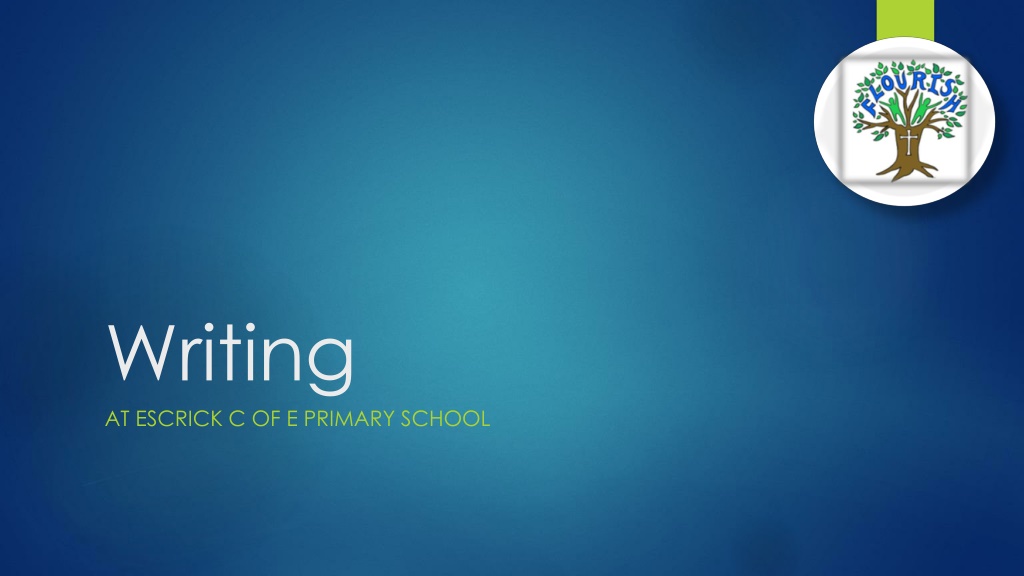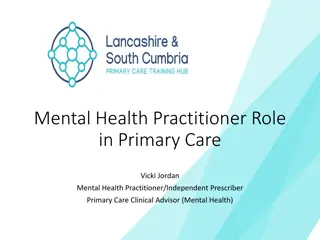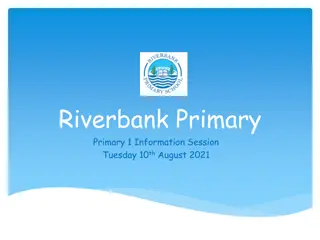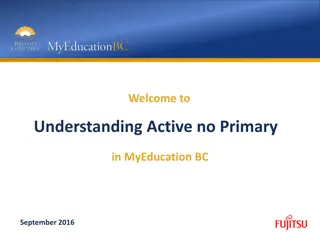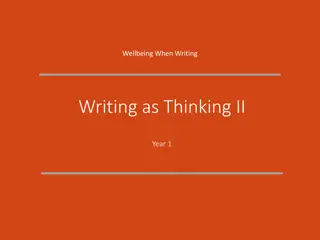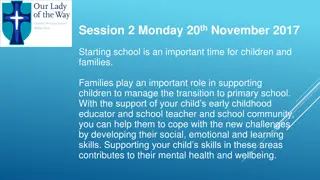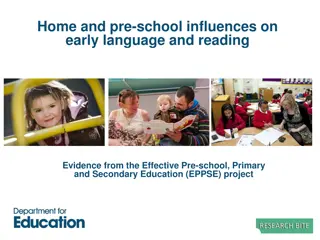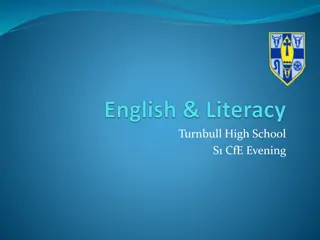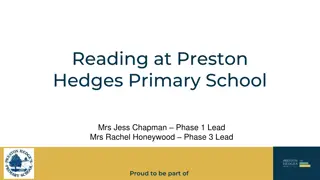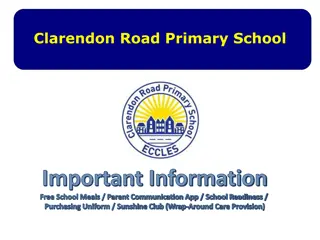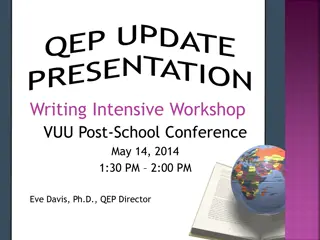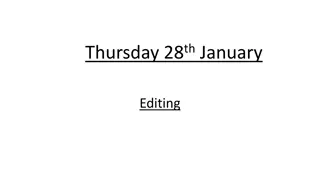Enhancing Writing Skills at Escrick C of E Primary School
At Escrick C of E Primary School, the approach to English education focuses on core skills like phonics, reading, writing, and letter formation. The curriculum incorporates a variety of text types and genres, including persuasive writing, biographies, fiction, and poetry. Writing activities are embedded into various subjects to create a holistic learning experience. The school's writing curriculum is text-based, drawing inspiration from quality texts to stimulate students' creativity and engagement. Progression in writing is emphasized across elements such as spelling, grammar, handwriting, composition, and punctuation. Punctuation skills are developed progressively from year to year, culminating in the confident use of various punctuation marks. Daily writing sessions and opportunities across subjects help students practice and enhance their writing skills.
Download Presentation

Please find below an Image/Link to download the presentation.
The content on the website is provided AS IS for your information and personal use only. It may not be sold, licensed, or shared on other websites without obtaining consent from the author. Download presentation by click this link. If you encounter any issues during the download, it is possible that the publisher has removed the file from their server.
E N D
Presentation Transcript
Writing AT ESCRICK C OF E PRIMARY SCHOOL
Writing at Escrick Our approach to English at Escrick School focuses on the core skills (phonics, reading, writing and letter formation) and is brought to life through creative and engaging learning experiences. We read and plan from a range of rich texts and ensure writing opportunities are given across the curriculum. Our Long Term Plans cover a range of text types and genres, such as persuasive writing and biographies as well as traditional fiction such as stories in familiar settings and traditional tales. Each term we also cover a unit of poetry with a focus on vocabulary, word play and performance.
Writing Curriculum text focused Our Curriculum for writing is text based. Each class topic is based on a quality text that promotes writing opportunities in different subjects. For example Traction Man in Year 2 is about a superhero toy brought to life by his owner. This makes a link between materials in Science and story writing. In Year 4, children read The Littlest Viking which is a funny story about a Viking girl in modern times. This makes links between History and story writing. In Year 6, children study Trash which has links to global issues and is an exciting and thought-provoking read.
Progression Our writing curriculum is progressive across all elements of writing. Spelling, grammar, handwriting, composition and punctuation.
Punctuation progression Year 1 Year 2 Year 3 Year 4 Year 5 Year 6 Capital letters, full stops, question marks and exclamation marks. Capital letters, full stops and exclamation marks. Consolidate Year 2 vocabulary and grammar Reinforce Year 2 and Year 3 vocabulary and grammar Recap content from Y3, 4. Recap content from Y3, 4 and 5. Begin to use: Commas in a list. Revise apostrophes for contractions and possession. Revise apostrophes for contractions and possession. Confidently use: Semi colon, colon and dash. Capitals for names, proper nouns and personal pronoun I. Apostrophe for contraction and possession. Semi colon, colon and dash. Parenthesis brackets, commas and hyphens. Capital letters (sentences, proper nouns, titles and subheadings), full stops, question marks and exclamation marks consistency. Capital letters (sentences, proper nouns, titles and subheadings), full stops, question marks and exclamation marks consistency. Beginning inverted commas for speech. Parenthesis brackets, commas and hyphens. Commas between clauses. Commas between clauses. Commas before conjunctions and after adverbials. Bullet points to list information. Commas for fronted adverbials. Commas for fronted adverbials. Bullet points to list information. Ellipses as cohesive device. Ellipsis. Ellipses as cohesive device. Direct and reported speech. Each year group recaps the previous year and builds in new elements. Punctuation is often about following and applying a rule so this skill is something that needs practise to embed.
How is it taught? Daily writing sessions and opportunities to write in other subjects. The key focus of English lessons is the class text or a model text. Children spend time reading this, discussing it and picking apart the key features of the grammar and vocabulary used. Time is given to practise using new vocabulary and apply grammatical features discretely before then using this in their own writing. Towards the end of a unit, planning and drafting a longer piece of writing will take place. From Year 2 upwards, children are taught how to edit and improve writing by adding/changing vocabulary or adding in specific features to make it better for the reader.
How is writing assessed? Each term, teachers give children the opportunity to complete a cold write this is usually around 3 to 4 weeks after a unit has been taught. This is effectively where they are given a genre and a topic and are asked to write. There may be some guidance with planning or time to talk, draw or act out their ideas. It is a chance for children to show what they can do when they are not heavily guided or scaffolded by the teacher.
Assessment We assess writing each term and use the specific year group criteria that cover the key areas of writing as mentioned at the beginning: Spelling Handwriting Composition Punctuation Children are encouraged to use resources in the classroom to help them with their writing, such as dictionaries, thesauruses, word banks and displays.
Support with writing at home Spelling practise the weekly spellings Encourage them to sound out and spell words themselves and read it back to check Keep a diary especially at half term or during the holidays Read quality texts together no matter their age or reading ability, even listening to texts by great authors can have an impact on the quality of their writing. Write whenever and wherever you can get them to help write the shopping list, make a poster for a lost item, write a letter to a family member, a thank you card, etc. Creative writing skills Lexi Rees. Fun ideas and prompts for creative writing.
